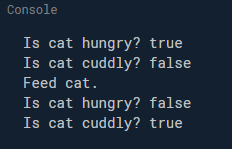Dart – Getters and Setters
Last Updated :
14 Jul, 2020
Getters and Setters, also called accessors and mutators, allow the program to initialize and retrieve the values of class fields respectively.
- Getters or accessors are defined using the get keyword.
- Setters or mutators are defined using the set keyword.
A default getter/setter is associated with every class. However, the default ones can be overridden by explicitly defining a setter/ getter. A getter has no parameters and returns a value, and the setter has one parameter and does not return a value.
Syntax: Defining a getter
Return_type get identifier
{
// statements
}
Syntax: Defining a setter
set identifier
{
// statements
}
Example 1:
The following example shows how you can use getters and setters in a Dart class:
Dart
class Student {
String name;
int age;
String get stud_name {
return name;
}
void set stud_name(String name) {
this.name = name;
}
void set stud_age(int age) {
if(age<= 0) {
print("Age should be greater than 5");
} else {
this.age = age;
}
}
int get stud_age {
return age;
}
}
void main() {
Student s1 = new Student();
s1.stud_name = 'Nitin';
s1.stud_age = 0;
print(s1.stud_name);
print(s1.stud_age);
}
|
Output:
Age should be greater than 5
Nitin
Null
Example 2:
Dart
void main() {
var cat = new Cat();
print("Is cat hungry? ${cat.isHungry}");
print("Is cat cuddly? ${cat.isCuddly}");
print("Feed cat.");
cat.isHungry = false;
print("Is cat hungry? ${cat.isHungry}");
print("Is cat cuddly? ${cat.isCuddly}");
}
class Cat {
bool _isHungry = true;
bool get isCuddly => !_isHungry;
bool get isHungry => _isHungry;
bool set isHungry(bool hungry) => this._isHungry = hungry;
}
|
Output:

Like Article
Suggest improvement
Share your thoughts in the comments
Please Login to comment...